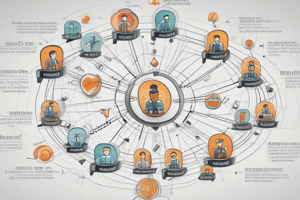Podcast
Questions and Answers
What is the main purpose of a business policy?
What is the main purpose of a business policy?
- To provide a framework for decision-making (correct)
- To create complex procedures
- To define personal goals of the management
- To increase employee workload
Which component of business policy ensures adherence to laws and regulations?
Which component of business policy ensures adherence to laws and regulations?
- Responsibility
- Compliance (correct)
- Objectives
- Scope
What is the first step in the policy development process?
What is the first step in the policy development process?
- Consultation
- Assessment (correct)
- Drafting
- Research
Which type of business policy would likely cover marketing strategies?
Which type of business policy would likely cover marketing strategies?
What challenge might organizations face regarding business policy?
What challenge might organizations face regarding business policy?
Which component of business policy clearly defines goals and outcomes?
Which component of business policy clearly defines goals and outcomes?
How does a business policy enhance organizational effectiveness?
How does a business policy enhance organizational effectiveness?
What role does feedback play in the evaluation of business policy?
What role does feedback play in the evaluation of business policy?
Which policy type addresses the guidelines for day-to-day operations within a company?
Which policy type addresses the guidelines for day-to-day operations within a company?
What does the 'scope' component of business policy outline?
What does the 'scope' component of business policy outline?
Flashcards are hidden until you start studying
Study Notes
Definition of Business Policy
- A set of guidelines or principles that govern decisions and actions within an organization.
- Aims to align organizational goals with operational capabilities.
Purpose of Business Policy
- Provides a framework for decision-making.
- Ensures consistency in operations and strategy.
- Facilitates communication and understanding among stakeholders.
Key Components
- Objectives: Define clear goals and outcomes.
- Scope: Outline the areas and departments affected.
- Guidelines: Establish rules for decision-making processes.
- Responsibility: Assign roles and accountability for implementation.
- Compliance: Ensure adherence to laws, regulations, and ethical standards.
Types of Business Policies
- Operational Policies: Cover day-to-day operations (e.g., HR policies, safety protocols).
- Financial Policies: Guide financial management and investment strategies.
- Marketing Policies: Direct marketing and promotional activities.
- Governance Policies: Establish rules for governance and compliance.
Importance of Business Policy
- Enhances organizational effectiveness and efficiency.
- Reduces risks by providing clear procedures.
- Supports strategic alignment across departments.
- Fosters a culture of accountability and integrity.
Policy Development Process
- Assessment: Evaluate current policies and organizational needs.
- Research: Gather information on best practices and regulations.
- Drafting: Create a draft policy document.
- Consultation: Involve stakeholders for feedback and input.
- Implementation: Roll out the policy with training and resources.
- Review: Regularly assess and update policies as necessary.
Challenges in Business Policy
- Resistance to change from employees.
- Balancing flexibility with adherence to policy.
- Ensuring policies remain relevant in a dynamic business environment.
Evaluation of Business Policy
- Monitor compliance and effectiveness.
- Gather feedback from stakeholders.
- Analyze outcomes and make necessary adjustments.
Definition of Business Policy
- Guidelines that shape decisions and actions within organizations.
- Aligns organizational goals with operational capabilities.
Purpose of Business Policy
- Provides a structured framework for decision-making.
- Ensures consistent operations and strategies across the organization.
- Enhances communication and understanding among stakeholders.
Key Components
- Objectives: Clear definitions of goals and desired outcomes.
- Scope: Identification of impacted areas and departments.
- Guidelines: Rules established for clear decision-making processes.
- Responsibility: Designation of roles and accountability for policy enactment.
- Compliance: Commitment to adhere to legal, regulatory, and ethical standards.
Types of Business Policies
- Operational Policies: Manage daily operations (e.g., HR practices, safety procedures).
- Financial Policies: Direct financial oversight and investment approaches.
- Marketing Policies: Guide marketing strategies and promotional efforts.
- Governance Policies: Set forth rules for governance and regulatory compliance.
Importance of Business Policy
- Enhances overall organizational effectiveness and efficiency.
- Reduces risks by establishing clear protocols and procedures.
- Supports alignment of strategic goals across various departments.
- Cultivates a culture of accountability and ethical integrity.
Policy Development Process
- Assessment: Review and evaluate existing policies against organizational needs.
- Research: Compile information on best practices and industry regulations.
- Drafting: Formulate a preliminary version of the policy document.
- Consultation: Engage stakeholders to collect feedback and refine the policy.
- Implementation: Launch the policy along with necessary training and resources.
- Review: Continuously assess and update policies to ensure ongoing relevance.
Challenges in Business Policy
- Employee resistance to changes in established protocols.
- Difficulty in balancing policy adherence with organizational flexibility.
- Need to keep policies relevant amid a rapidly changing business landscape.
Evaluation of Business Policy
- Conduct monitoring for compliance and overall policy effectiveness.
- Solicit and analyze feedback from stakeholders to identify areas for improvement.
- Regularly assess outcomes to facilitate necessary policy adjustments.
Studying That Suits You
Use AI to generate personalized quizzes and flashcards to suit your learning preferences.




